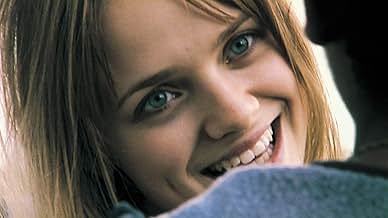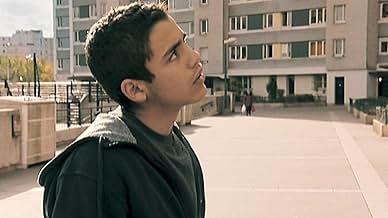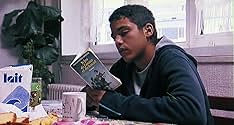L'esquive
- 2003
- 1h 57min
CALIFICACIÓN DE IMDb
6.9/10
3.3 k
TU CALIFICACIÓN
Agrega una trama en tu idiomaKrimo a 15 years old shy boy falls in love for Lídia who is his classmate.To be able to assume his love for her he decides to take a part in the play that was to be one of his friends.Krimo a 15 years old shy boy falls in love for Lídia who is his classmate.To be able to assume his love for her he decides to take a part in the play that was to be one of his friends.Krimo a 15 years old shy boy falls in love for Lídia who is his classmate.To be able to assume his love for her he decides to take a part in the play that was to be one of his friends.
- Dirección
- Guionistas
- Elenco
- Premios
- 16 premios ganados y 5 nominaciones en total
Meriem Serbah
- Krimo's Mother
- (as Meryem Serbah)
Opiniones destacadas
I'm going to keep it short.
To be honest I didn't want to see this film, however I had to go so a movie at a film festival for my international cinema class. When I left it was one of those experiences where you want to truly thank a teacher for making you do something. Altogether this was a great movie, yes it was long, however the director captured the real emotions and nuances of teens in love so amazingly you feel like he stole the performances from the young actors. Not to mention this movie gives a great view of the hardships for minorities in the south of France, by not directly addressing them.
Check this movie out, no matter what you won't be mad that you saw it.
To be honest I didn't want to see this film, however I had to go so a movie at a film festival for my international cinema class. When I left it was one of those experiences where you want to truly thank a teacher for making you do something. Altogether this was a great movie, yes it was long, however the director captured the real emotions and nuances of teens in love so amazingly you feel like he stole the performances from the young actors. Not to mention this movie gives a great view of the hardships for minorities in the south of France, by not directly addressing them.
Check this movie out, no matter what you won't be mad that you saw it.
I really did like this film! - those viewers, French or otherwise, who have seen, and been able to follow the sound track of La Haine, will be quite at home in this environment, will know what to expect, and will be sensitive to the message the film conveys. True, it may lack the sort of 'excitement'that some film-goers may seek, but one has to take it for what it is: a hard-hitting social document which will resonate with many who are familiar with the inner-city tensions found in many French towns in recent years. The gambit of choosing amateur actors worked very well,in my opinion, a point which other viewers seem to echo.
I think this film deserve theirs Césars for a lot of reasons. The actors are excellent, especially Sara Forestier who's not from suburbs and has learned all words of this 'particular' vocabulary. The screenplay is very well, finally that's a play in a play ("le Jeu De l'Amour Et Du Hasard" written by Marivaux). This film shows almost the reality, is sometimes funny. The french teacher is disgusting, she is exactly what the director wants to fight : a society were there is no hope for an inhabitant of suburbs. As to her, Kremo is an idiot because he will never be Arlequin, he 'll never be in love and he doesn't even know how to play it. The film shows how wrong it is... The low point of the film is the sound, very bad, I think they wanted to be more realistic but that could be better, and realistic. This film is well to see, everyone can learn something.Even for french the language is hard to understand(sometimes we would have wanted subtitles!). I don't think the foreigners (particularly the ones who watch only blockbusters) will enjoy, or/and understand. But this freshly film is worth to be seen with attention.
Although imperfect from a cinematographic point of view, this film is remarkable as it penetrates deep into the lives of suburbia kids in Paris.
All kids are from North Africa. They are boeur, which means arab in their bizarre dialect of french. I really doubt an old french man or woman understand what they are saying without subtitles.
To love someone, to leave someone make deep marks in our souls when we are young.
This sincere and honest film about teenage love should not be missed, if there is any screening available.
All kids are from North Africa. They are boeur, which means arab in their bizarre dialect of french. I really doubt an old french man or woman understand what they are saying without subtitles.
To love someone, to leave someone make deep marks in our souls when we are young.
This sincere and honest film about teenage love should not be missed, if there is any screening available.
This movie is getting fresh exposure in France thanks to its win at Les Césars, or the "French Oscars" as other countries like to call them. Its success will probably mean that it now gets exposure outside the country, too, and I wonder how successfully.
Though an accurate and contemporary examination of France, the film's world is a foreign one, even to many people living here--the specificity of the setting (the projects, in a "suburb" of Paris), the language (rapid-fire, slangy, "vulgar", and peppered with "verlan", a street language of inverted syllables--the word itself could translate as "wardsback", and how anyone will translate this dialogue I have no idea), and the behavior (mostly arguing--strident, pushy, beautifully repetitive) may not play clearly outside of France. I'm not sure how clearly it plays here, or how willing people are to watch it, especially as it turns the idea of the scary bad French projects somewhat on its ear.
This isn't a criticism of the movie; on the contrary. Kechiche has shot a riveting cross-section of teenagers growing up in social housing, in broken homes and poverty, who lack the tools of expression, and who have adopted the posturing of the wounded (and, in the story, almost entirely absent) adults who raise them, attacking (the movie unfolds at a near-constant level of verbal aggression) and dodging ("esquiver" means "to dodge" or "to evade") one another's attacks with all they can muster.
The film's intensely political side feels almost accidental; in its unfolding, it has great heart, and its actors, who are apparently mostly amateurs from around the shooting location, are outstanding. On the whole, it reminded me a great deal of David Gordon Green's George Washington: a simple love story set against a landscape of poverty, played out frankly and honestly, allowed to unfold at a distinctly un-Hollywoodian rhythm. If Green's film is more beautiful cinematic ally, L'Esquive is more concentrated, more unflinching in its examination of the deep repercussions and violence of economic, social, and familial hardship. Its statement that France is no longer a country of the French-of-French-ancestry, and that its refusal to accept its own transformation does not mean its lost generation accepts its loss, could not be more clearly nor more poignantly made.
Without spoiling or going into detail, there are things about the plot that are implausible, things that probably hurt the film overall, but watching this movie for plot is like watching Ocean's Eleven for social insight. This is a positive study of character in a bad situation, of a stratum of society rarely filmed and still more rarely treated as fairly as it is offered up here, beautifully and eloquently.
Though an accurate and contemporary examination of France, the film's world is a foreign one, even to many people living here--the specificity of the setting (the projects, in a "suburb" of Paris), the language (rapid-fire, slangy, "vulgar", and peppered with "verlan", a street language of inverted syllables--the word itself could translate as "wardsback", and how anyone will translate this dialogue I have no idea), and the behavior (mostly arguing--strident, pushy, beautifully repetitive) may not play clearly outside of France. I'm not sure how clearly it plays here, or how willing people are to watch it, especially as it turns the idea of the scary bad French projects somewhat on its ear.
This isn't a criticism of the movie; on the contrary. Kechiche has shot a riveting cross-section of teenagers growing up in social housing, in broken homes and poverty, who lack the tools of expression, and who have adopted the posturing of the wounded (and, in the story, almost entirely absent) adults who raise them, attacking (the movie unfolds at a near-constant level of verbal aggression) and dodging ("esquiver" means "to dodge" or "to evade") one another's attacks with all they can muster.
The film's intensely political side feels almost accidental; in its unfolding, it has great heart, and its actors, who are apparently mostly amateurs from around the shooting location, are outstanding. On the whole, it reminded me a great deal of David Gordon Green's George Washington: a simple love story set against a landscape of poverty, played out frankly and honestly, allowed to unfold at a distinctly un-Hollywoodian rhythm. If Green's film is more beautiful cinematic ally, L'Esquive is more concentrated, more unflinching in its examination of the deep repercussions and violence of economic, social, and familial hardship. Its statement that France is no longer a country of the French-of-French-ancestry, and that its refusal to accept its own transformation does not mean its lost generation accepts its loss, could not be more clearly nor more poignantly made.
Without spoiling or going into detail, there are things about the plot that are implausible, things that probably hurt the film overall, but watching this movie for plot is like watching Ocean's Eleven for social insight. This is a positive study of character in a bad situation, of a stratum of society rarely filmed and still more rarely treated as fairly as it is offered up here, beautifully and eloquently.
¿Sabías que…?
- TriviaThe movie is dedicated Slaheddine.
- ConexionesReferenced in Leçon de cinéma: Arnaud Desplechin et Mathieu Amalric (2019)
- Bandas sonorasWarini Werak Tergoud
Performed by Cheba Zahouania
Written and Composed by Cheikha Rimitti
Production: MLP / History
Selecciones populares
Inicia sesión para calificar y agrega a la lista de videos para obtener recomendaciones personalizadas
- How long is Games of Love and Chance?Con tecnología de Alexa
Detalles
- Fecha de lanzamiento
- País de origen
- Idioma
- También se conoce como
- Games of Love and Chance
- Locaciones de filmación
- Saint-Denis, Seine-Saint-Denis, Francia(Cité des Francs-Moisins: housing complex, Rue du M.al Lyautey: police control)
- Productoras
- Ver más créditos de la compañía en IMDbPro
Taquilla
- Total en EE. UU. y Canadá
- USD 8,085
- Fin de semana de estreno en EE. UU. y Canadá
- USD 2,529
- 4 sep 2005
- Total a nivel mundial
- USD 1,747,263
- Tiempo de ejecución1 hora 57 minutos
- Color
- Mezcla de sonido
- Relación de aspecto
- 1.85 : 1
Contribuir a esta página
Sugiere una edición o agrega el contenido que falta























